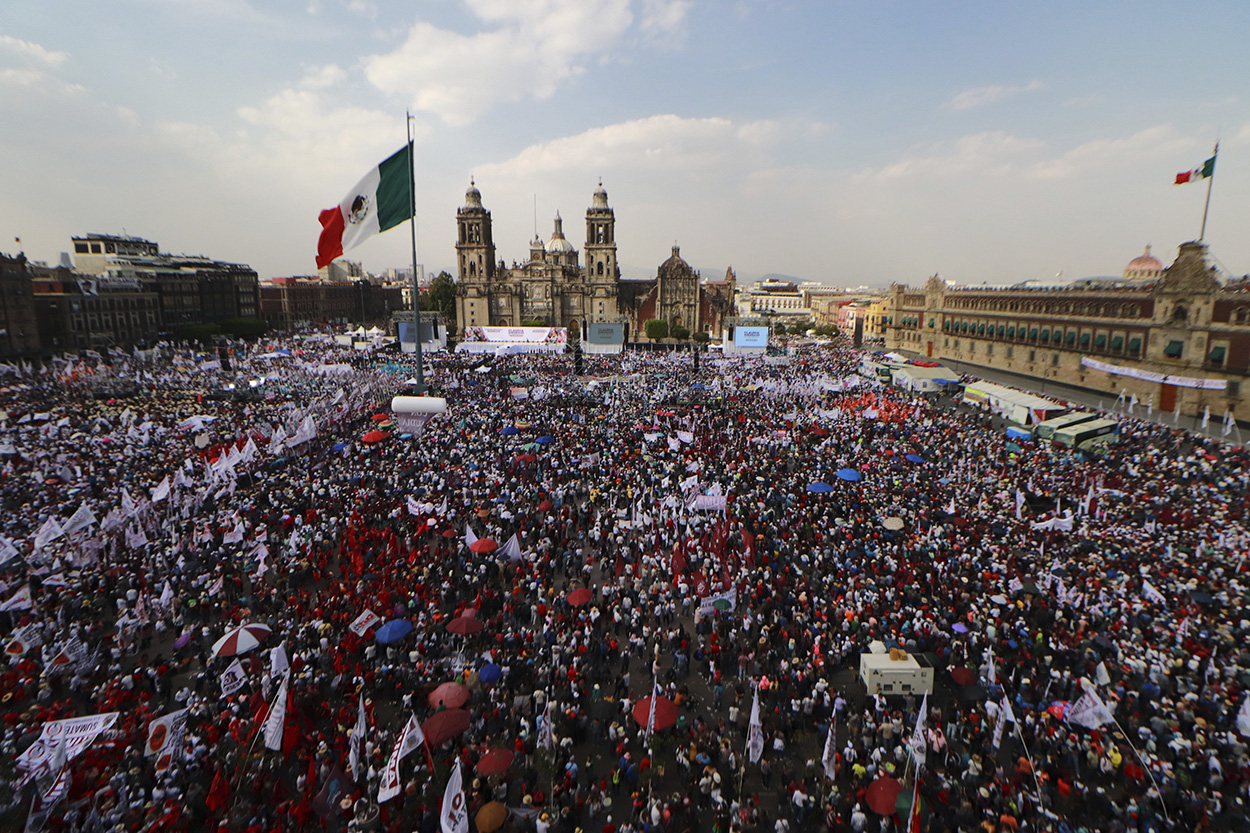Mexico: Economic Prospects and Opportunities in the New Global Scenario
Mexico: Economic Prospects and Opportunities in the New Global Scenario
AS/COA's annual Mexico City conference featured a keynote speech by Mexican President Felipe Calderón. With economic and security matters ranking high on the U.S.-Mexico agenda, ministers and private sector leaders commented on opportunities for cooperation.
Speakers:
Opening Keynote Speaker: Felipe Calderón Hinojosa, President of Mexico
- Fernando Goméz Mont Urueta, Secretary of the Interior
- Gerardo Ruíz Mateos, Secretary of the Economy
- Miguel Messmacher Linartas, Head of Economic Planning, Secretariat of Finance of Mexico
- Bruno Ferrari, President and CEO, ProMéxico
- Marc Frishman, Partner, Conduit Capital Partners
- Alberto Gómez Alcalá, Chief Economist, Banamex.
- Amb. James R. Jones, Co-Chairman and CEO, Manatt Jones Global Strategies and Former U.S. Ambassador to Mexico
- Amb. Richard McCormack, Vice Chairman, Merrill Lynch & Co.
- Susan Segal, President & CEO, Americas Society/Council of the Americas
- Amb. Ira Shapiro, Partner, Greenberg Traurig LLP and former General Counsel and Chief Trade Negotiator with Japan and Canada in the Office of the U.S. Trade Representative (USTR)
- Alfredo Thorne, Managing Director and Senior Economist, JPMorgan
Summary
On March 12, 2009, AS/COA hosted the 2009 Latin American Cities Conference in Mexico City, entitled “Mexico: Economic Prospects and Opportunities in the New Global Scenario.” The conference was organized in association with ProMéxico and in collaboration with the Bolsa Mexicana de Valores (BMV), Confederación de Cámaras Nacionales de Comercio Servicios y Turismo (CONCANACO), Consejo Coordinador Empresarial (CCE), Consejo Empresarial Mexicano (COMCE), and the Consejo Mexicano de Asuntos Internacionales (COMEXI).
Speakers focused on the outlook for relations between the United States and Mexico under the new U.S. administration. With the issue of security high on the bilateral agenda and an economic crisis affecting both countries, panelists commented on the impact of security on the Mexican economy and the necessity of cooperation between both countries to succeed in confronting the financial crisis.
President Calderón’s remarks
During his keynote speech, Mexican President Felipe Calderón challenged recent allegations that his government’s control over the country was tottering and criticized what he saw as an “enormous distortion” abroad of Mexico’s current reality. Calderón emphasized that his government is working hard to tackle organized crime, enforce legality and rid the government of corruption, waging “an unprecedented battle” aimed at the root of these problems. He called upon U.S. President Barack Obama to transmit to the media his administration’s sense of shared responsibility in the fight against bilateral issues. In reference to the investigations into corruption among government officials, Calderón said this demonstrated his administration’s firm commitment to rule of law.
Security and Investment
While speakers differed on their visions of the effects of the security situation in Mexico on investment and economic growth, all recognized the importance of the government’s efforts in combating violence related to organized crime and securing rule of law. Secretary of the Interior Fernando Gomez Mont pointed to the encouraging results of these efforts, citing recent massive confiscations of arms, drugs, and money. Chief Economist of Banamex Alberto Gómez Alcalá said that the decrease in investment flows stems primarily from the current global recession and, in his view, was not related to the issue of security. However, he warned that security “is a factor that investors are observing closely.” Ira Shapiro of Greenberg Traurig agreed with Gómez, asserting that violence in Mexico has not impacted U.S. investment. Other speakers expressed concern that foreign media coverage is effecting investors’ perception of the country. “Mexico is seen as place filled with violence, and this is not the case; press reports do not help us change this and investors do not see Mexico as a good place to invest,” said JPMorgan’s Alfredo Thorne. AS/COA President & CEO Susan Segal, commented that, unlike the press, investors have a better understanding of the country and its economy and are closely following the government’s actions.
Mexico and the Global Recession
Speakers agreed that Mexico is feeling the effects of the global economic downturn. The Senior Economist at JPMorgan said the firm projects Mexico’s GDP will plunge by 4 percent this year. As a consequence, Head of Economic Planning at the Secretariat of Finance Miguel Messmacher Linartas estimated that Mexico will suffer a current account deficit of $9 billion.
Secretary of the Economy Gerardo Ruíz Mateos detailed the government’s plans to bolster the Mexican economy, emphasizing the importance of incentivizing competitiveness to attract foreign investment. He highlighted to investors Mexico’s two advantages over other destinations for investment—its privileged geographical location and highly qualified human resources. According to Messmacher, apart from the recently implemented stimulus package (which represents 1.5 percent of the country’s GDP), the Mexican government will not have to make any major adjustments, due in part to the depreciation of the peso. In relation to the response of the government, Segal commented that Mexico will be a winner for future investment flows given how “transparent and predictable” its government has acted throughout the crisis. All panelists agreed that Mexico’s banking sector is in better shape to confront the crisis than in previous times.
U.S.-Mexico relations under the new administration
With a new administration in Washington, the U.S.-Mexican relationship and its present and future prospects figured prominently throughout speakers’ remarks. In regards to security, both Mont and former U.S. Ambassador to Mexico James Jones stressed the importance of confronting this problem in cooperation and agreed it should be a top priority in the bilateral relationship. At the same time, Mont spoke of the unique “cultural syncretism” between the two countries and underscored the importance of situating this effort within the context of issues of bilateral importance.
On the economic agenda, both countries were urged by speakers to honor their trade agreements and resist protectionist provisions. Referring to the United States, Susan Segal emphasized the importance of trade to global economic recovery and the creation of jobs, not just in the United States, but around the world. Mexico’s commitment to NAFTA was reinforced by Ruíz, who signaled that “Mexico is convinced that economic openness is the best way to face today’s challenges.”







